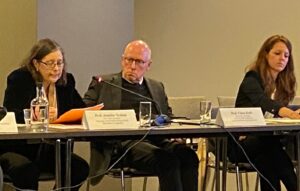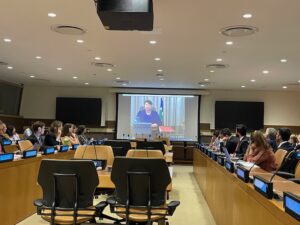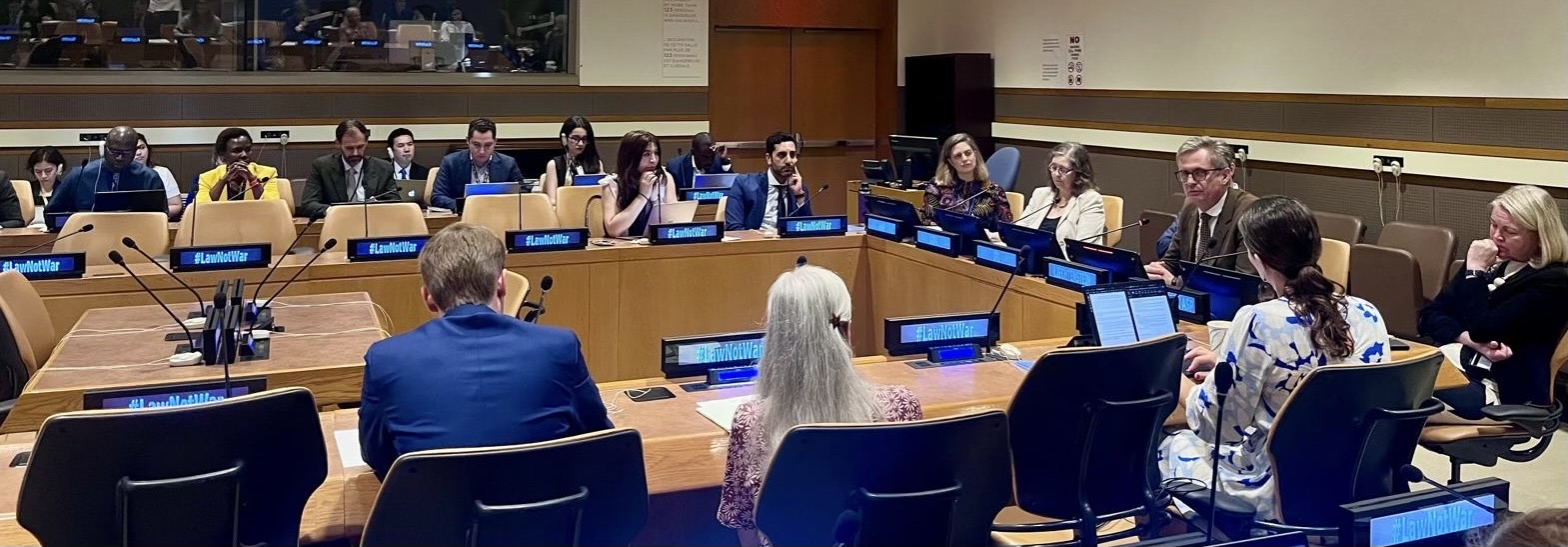

Our purpose: Promoting peace through criminal justice – preventing crimes of aggression
Through the United Nations Charter, States have expressed their commitment “to save succeeding generations from the scourge of war”. They have agreed to renounce the illegal threat or use of force, and to settle their disputes “by peaceful means in such a manner that international peace and security, and justice, are not endangered”. States have the legal duty to abide by this commitment and the UN Security Council has the primary responsibility to enforce it.The Nuremberg Trials made it clear that criminal justice also has an important role to play for the promotion of peace and the deterrence of acts of aggression – though it remained limited and theoretical for many decades thereafter. With the 2010 Kampala amendments to the Rome Statute of the International Criminal Court, States Parties created a new mechanism to enforce the most important rule of international law: the prohibition of the illegal use of force under the United Nations Charter. This website is dedicated to making accountability a reality.
News
Side Event at the Assembly of States Parties 2024: During the December 2-6, 2024, meeting of the ICC‘s Assembly of States Parties in The Hague, Netherlands, a side-event panel was held entitled “Reviewing the ICC’s Jurisdiction over the Crime of Aggression: Addressing a Double Standard in International Law.”
It featured government ministers from Slovenia, Costa Rica and Germany, as well as Liechtenstein Ambassador Christian Wenaweser, and Professor Charles Jalloh, Professor Claus Kress, and Professor  Jennifer Trahan. It was sponsored by Costa Rica, The Gambia, Liechtenstein, Germany, Sierra Leone, Slovenia, Vanuatu, the European Center for Constitutional and Human Rights, and the Global Institute for the Prevention of Aggression. It focussed on the need for the ASP to harmonize the jurisdiction in the ICC’s Rome Statute regarding all four Rome Statute crimes.
Jennifer Trahan. It was sponsored by Costa Rica, The Gambia, Liechtenstein, Germany, Sierra Leone, Slovenia, Vanuatu, the European Center for Constitutional and Human Rights, and the Global Institute for the Prevention of Aggression. It focussed on the need for the ASP to harmonize the jurisdiction in the ICC’s Rome Statute regarding all four Rome Statute crimes.
Discussion Paper for the Mandated Review of the Aggression Amendments: On 8 November 2024, the Permanent Representatives of Costa Rica, Sierra Leone, Vanuatu, Germany and Slovenia sent a discussion paper to all States Parties to the Rome Statute in preparation of the mandated review of the Aggression Amendments in 2025. The discussion paper had previously been elaborated by a cross-regional group of friends and points out two options for how Article 15 bis of the Rome Statute can be revised to bring the Court’s jurisdictional regime over the crime of aggression in line with its jurisdiction over genocide, war crimes and crimes against humanity.
Ukraine will become the 125th State Party to the Rome Statute of the International Criminal Court: On October 25, 2024, Ukraine officially deposited with the United Nations its instrument of ratification of the Rome Statute of the International Criminal Court. Thus, the ratification will take effect on January 1, 2025. This will make Ukraine the 125th State Party to the Rome Statute and the 46th ratifier of the Kampala Amendments on the crime of aggression.
Ukraine and the ratification of the Rome Statute: On the Independence Day of Ukraine on 24 August 2024, Ukrainian President Zelenskyy symbolically signed the law previously adopted by the Ukrainian Parliament to ratify the Rome Statute of the International Criminal Court (ICC) and its Kampala amendments on the crime of aggression. The formal deposit of Ukraine’s instrument of ratification will be made in due course. Once effective, Ukraine’s ratification would give the ICC jurisdiction over the crime of aggression going back to July 17, 2018. However, due to the carve out of nationals of non-State Parties under Article 15bis (5) of the Rome Statute, the ICC would not be able to exercise jurisdiction over Russian nationals for the crime of aggression committed against Ukraine. Additionally, Ukraine has invoked Article 124 of the Rome Statute to exempt its nationals from the ICC’s jurisdiction over war crimes for a period of seven years, while it is unclear whether such a selective use of Article 124 is allowed under the Rome Statute.
Robert Kempner Prize 2024: On 4 May 2024, Annegret Hartig received the Robert Kempner Prize for her monograph “Making Aggression a Crime Under Domestic Law. On the Legislative Implementation of Article 8bis of the ICC Statute.“ The Robert Kempner Prize is awarded by the Association of German Speaking International Criminal Lawyers (Arbeitskreis Völkerstrafrecht) for outstanding monographs in the field of international criminal law with a connection to German speaking legal orders and written by scholars who have not yet reached the age of 35. The jury observed the breadth and depth of Annegret Hartig’s analysis of the crime of aggression and the various techniques of implementing this international crime into domestic law. The jury emphasized that the study also substantially engaged with fundamental concepts of international criminal law, such as personal and functional immunity, universal jurisdiction and the duty of States to enforce international criminal law. The jury concluded that Annegret Hartig’s work qualifies as a basic work of the discipline.
Side-Event on the Occasion of the International Justice Day: On July 18, 2024, the Permanent Missions of Costa Rica, the Gambia, Germany, Liechtenstein, Slovenia and Vanuatu to the United Nations as well as the Global Institute for the Prevention of Aggression, held a side-event at the United Nations. It was entitled “Reviewing the ICC’s Jurisdiction over the Crime of Aggression: Addressing a Double Standard in International Law.” The welcoming remarks were given by the President of the ASP Paivi Kaukoranta. The panelist were Ambassador Christian Wenaweser, Ambassador Zeid Ra’ad Al Hussein and the Convenor of the GIPA Jennifer Trahan.  The panel discussed the importance of States using the mandated review of the Kampala amendments on the crime of aggression to harmonize the ICC’s jurisdiction over all four of its core crimes. Former Chief Prosecutor of the ICC Fatou Bensouda gave the closing remarks.
The panel discussed the importance of States using the mandated review of the Kampala amendments on the crime of aggression to harmonize the ICC’s jurisdiction over all four of its core crimes. Former Chief Prosecutor of the ICC Fatou Bensouda gave the closing remarks.
A recording of the event can be found here.
GIPA’s call to all States Parties on the International Justice Day 2024: On 17 June 2024, the Global Institute for the Prevention of Aggression calls on all States Parties to the Rome Statute to “[t]ake action to negotiate and agree on amendments to Article 15 bis of the Rome Statute that align the ICC’s jurisdiction over the crime of aggression with its jurisdiction over the other core international crimes”. These amendments should “reflect the fundamental principles of international criminal law, including the equality of all individuals before the law”. For the full statement, see here.
Meeting of the Global Institute for the Prevention of Aggression: On 2 June 2024, the members of the Global Institute for the Prevention of Aggression (GIPA) met in The Hague to discuss the possibilities of amending the Rome Statute to harmonize the jurisdiction of the ICC over all four core crimes. The Convenor Jennifer Trahan explained why there should be an amendment. Carrie McDougall presented the GIPA proposal, followed by Astrid Reisinger Coracini who explained the two options currently discussed by a group of states convened by Germany. The meeting ended with Ambassador Wenaweser suggesting a strategy for building support for the amendment and a group discussion.



